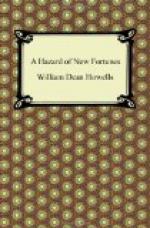“Ledt me zee,” mused Lindau. “Wass it in fifty-nine or zixty, Passil? Idt wass a year or dwo pefore the war proke oudt, anyway.”
“Those were exciting times,” said Dryfoos, making his first entry into the general talk. “I went down to Indianapolis with the first company from our place, and I saw the red-shirts pouring in everywhere. They had a song,
“Oh, never mind the weather, but
git over double trouble,
For we’re bound for the land
of Canaan.”
The fellows locked arms and went singin’ it up and down four or five abreast in the moonlight; crowded everybody’ else off the sidewalk.”
“I remember, I remember,” said Lindau, nodding his head slowly up and down. “A coodt many off them nefer gome pack from that landt of Ganaan, Mr. Dryfoos?”
“You’re right, Mr. Lindau. But I reckon it was worth it—the country we’ve got now. Here, young man!” He caught the arm of the waiter who was going round with the champagne bottle. “Fill up Mr. Lindau’s glass, there. I want to drink the health of those old times with him. Here’s to your empty sleeve, Mr. Lindau. God bless it! No offence to you, Colonel Woodburn,” said Dryfoos, turning to him before he drank.
“Not at all, sir, not at all,” said the colonel. “I will drink with you, if you will permit me.”
“We’ll all drink—standing!” cried Fulkerson. “Help March to get up, somebody! Fill high the bowl with Samian Apollinaris for Coonrod! Now, then, hurrah for Lindau!”
They cheered, and hammered on the table with the butts of their knife-handles. Lindau remained seated. The tears came into his eyes; he said, “I thank you, chendlemen,” and hiccoughed.
“I’d ‘a’ went into the war myself,” said Dryfoos, “but I was raisin’ a family of young children, and I didn’t see how I could leave my farm. But I helped to fill up the quota at every call, and when the volunteering stopped I went round with the subscription paper myself; and we offered as good bounties as any in the State. My substitute was killed in one of the last skirmishes—in fact, after Lee’s surrender—and I’ve took care of his family, more or less, ever since.”
“By-the-way, March,” said Fulkerson, “what sort of an idea would it be to have a good war story—might be a serial—in the magazine? The war has never fully panned out in fiction yet. It was used a good deal just after it was over, and then it was dropped. I think it’s time to take it up again. I believe it would be a card.”
It was running in March’s mind that Dryfoos had an old rankling shame in his heart for not having gone into the war, and that he had often made that explanation of his course without having ever been satisfied with it. He felt sorry for him; the fact seemed pathetic; it suggested a dormant nobleness in the man.
Beaton was saying to Fulkerson: “You might get a series of sketches by substitutes; the substitutes haven’t been much heard from in the war literature. How would ‘The Autobiography of a Substitute’ do? You might follow him up to the moment he was killed in the other man’s place, and inquire whether he had any right to the feelings of a hero when he was only hired in the place of one. Might call it ’The Career of a Deputy Hero.’”




